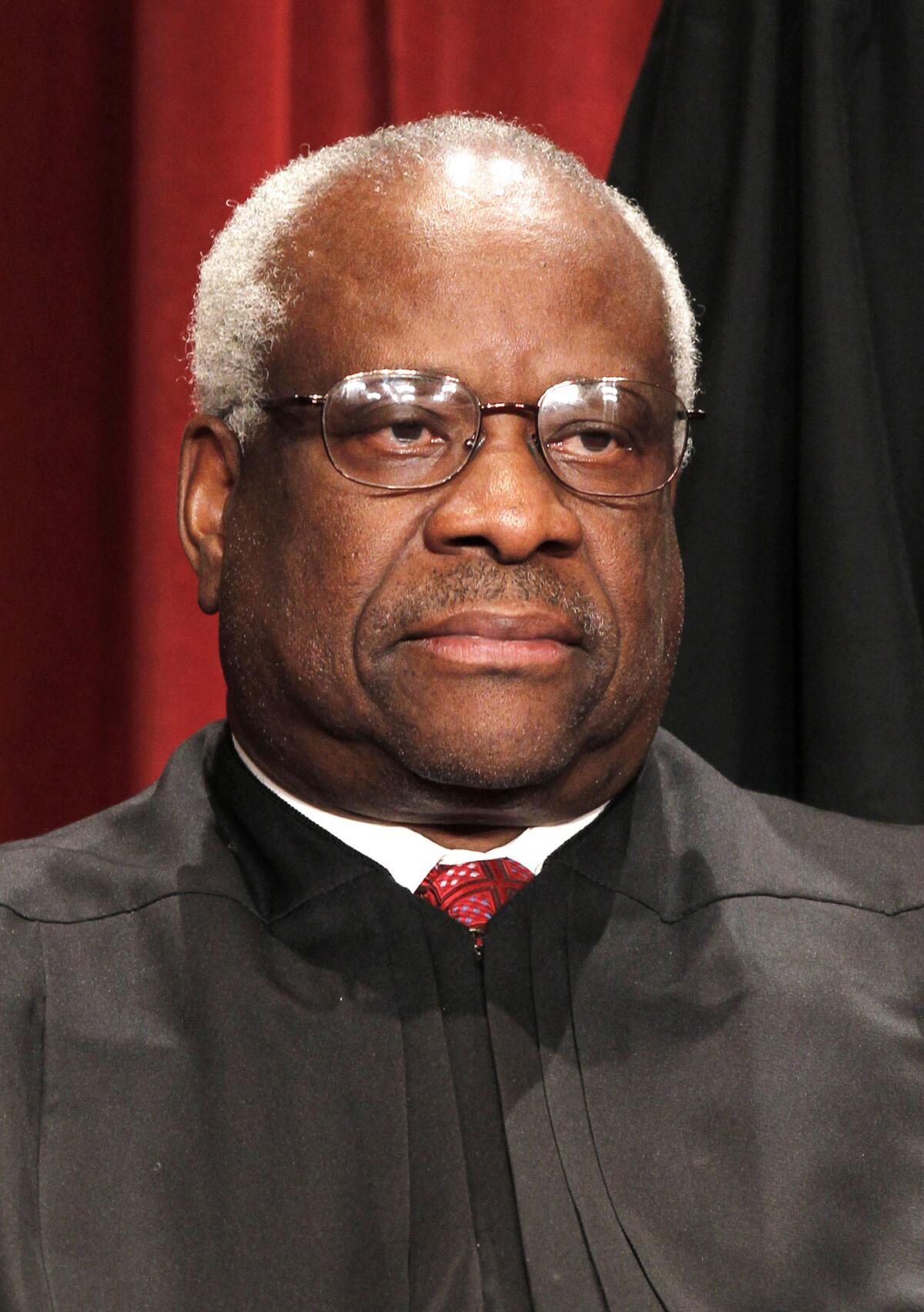Justice Clarence Thomas’ silence is ‘disgraceful’? Not really.

Justice Clarence Thomas in 2010. He is the subject of Jeffrey Toobin’s New Yorker column: “Clarence Thomas’ Disgraceful Silence.”
- Share via
Jeffrey Toobin, one of the best commentators on the Supreme Court, is accusing Justice Clarence Thomas of “not doing his job” because, as is widely known, Thomas doesn’t ask questions at the court’s oral arguments. (The headline on Toobin’s column in the New Yorker is even nastier: “Clarence Thomas’ Disgraceful Silence.”)
Toobin notes that it has been eight years since Thomas grilled a lawyer. But he doesn’t make much of a case for outrage over this admittedly odd behavior.
Here’s his best shot: “The court’s arguments are not televised (though they should be), but they are public. They are, in fact, the public’s only windows onto the justices’ thought processes, and they offer the litigants and their lawyers their only chance to look these arbiters in the eye and make their case. There’s a reason the phrase ‘your day in court’ resonates. It is an indispensable part of the legal system.”
Until the justices decide to admit cameras to their courtroom (don’t hold your breath), the public that is being denied the right to look into (or listen outside) the window of Thomas’ thoughts is tiny. And justices’ questions aren’t always windows into how they will eventually rule. Sure, sometimes they tip their hand, as Justice Antonin Scalia did when he asked the U.S. solicitor general if Obamacare’s individual mandate wasn’t like requiring people to buy broccoli. But a lot of questions fall into the devil’s advocate category.
You could amend Toobin’s arguments to say that the public has the right to hear those questions too, in order to evaluate a justice’s ability to role-play. But that’s a stretch. Anyway, the best way to access a window on a justice’s thought process is to read his or her published opinions. And Thomas’ are endlessly informative about his jurisprudence (sometimes scarily so).
Toobin’s article appeared a few days after an article in the New York Times quoted Justice Ruth Bader Ginsburg on why she opposed TV cameras in the courtroom. “It would leave a false impression of the appellate process to think that the oral argument is what is decisive in the cases,” Ginsburg said.
Toobin also argued that “if all nine justices behaved as Thomas does on the bench, [the] public would rightly, and immediately, lose all faith in the Supreme Court.” This is a variation on the slippery slope argument popular with lawyers. (If the court approves a healthcare mandate, next week it will approve a broccoli mandate.)
But the traditional response to the slippery slope (or “parade of horribles”) argument is “not while this court sits,” and that is literally the answer to Toobin’s hypothetical about nine mute justices. The Constitution will be amended to require the consumption of broccoli before Thomas’ colleagues follow his lead and clam up. Heck, even if seven of the other eight justices adopted a vow of silence, Scalia could fill the vacuum by himself.
As Toobin acknowledges, Thomas is a distinctive and occasionally influential thinker on the court, the “intellectual godfather” of important decisions even when he doesn’t write the majority opinion. So he seems to be doing the most important part of his job.
(Toobin also focuses on Thomas’ body language in the courtroom, writing that he looks up at the ceiling and strokes his chin — proof that he’s “not paying attention.” But other justices occasionally look distracted. Sometimes they even nod off.)
My theory is that Thomas has remained silent all these years to confound his critics. It certainly isn’t because he is tongue-tied or inarticulate. If you’re desperate to hear the sound of his voice, YouTube and C-SPAN preserve some of his comments in public settings outside the court.
Whatever the explanation, Thomas’ silence is strange. But disgraceful? A dereliction of duty? To quote Chief Justice John Marshall: “This is too extravagant to be maintained.”
ALSO:
The Iran I saw — in 781 days in Evin Prison
Morrison: Prince William’s smashingly bad idea
Follow Michael McGough on Twitter @MichaelMcGough3
More to Read
A cure for the common opinion
Get thought-provoking perspectives with our weekly newsletter.
You may occasionally receive promotional content from the Los Angeles Times.







